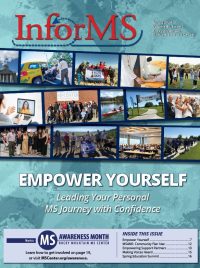
An Interview with Sara Froelich of the Chronic Care Collaborative
Living with a chronic disease like MS requires many different forms of self-advocacy. Whether that’s persistence in getting your questions answered during a visit with your clinicians, calling your insurance provider when a bill doesn’t make any sense, or working with your employer on necessary accommodations in the workplace, advocacy takes many different forms.
Another very important facet of advocacy is using the power of your voice to educate legislators and other decision-makers about the challenges you face in accessing care, support, and treatment, and the opportunities for policy change that would make a difference for you. Sharing your story with elected officials and other decision-makers at the local, state, and federal levels is a powerful way to advocate and to make change for you, your family, and your community.
The Rocky Mountain MS Center is a proud member of the Chronic Care Collaborative (CCC), a coalition of about 50 voluntary health organizations that advocates for all Coloradans living with chronic conditions and their caregivers. We recently sat down with the CCC’s Executive Director, Sara Froelich, to discuss the importance of uplifting the voices of individuals and families living with chronic diseases like MS.
InforMS: Could you please tell us more about the Chronic Care Collaborative?
Sara Froelich: The Chronic Care Collaborative (CCC) is made up of roughly 50 different nonprofit health care organizations representing a wide range of chronic diseases. The CCC is dedicated to improving access to quality, affordable, and integrated health care. It was founded roughly 16 years ago with the recognition that while different medical conditions impact individuals in very different ways, there are often themes found in barriers to accessing care. The CCC coalition was founded knowing that by working together, nonprofits could do more to improve health care for the broader chronic disease community.
The CCC meets at least monthly to discuss policies important to member organizations and their constituents. The CCC advocates at the Colorado State Capitol every year on Chronic Disease Awareness Day to talk with state legislators about barriers to access and the burdens of chronic disease on families, budgets, and people’s lives.
The CCC also engages year-round with policymakers and interested parties across the health care spectrum including insurance companies, hospitals, medical providers, prescription drug manufacturers, and state agencies. Having an ongoing, open-door relationship with those who create policy, implement policy or are part of the health care system helps to create common ground and work together to reduce barriers to care.
The CCC’s work with the Colorado state legislature focuses on advocating for the over 60% of Coloradans living with at least one chronic condition and their caregivers. This includes improving access to affordable and dependable health coverage and care, increasing community-based support services, encouraging access to behavioral health, and promoting wellness and prevention for those living with chronic conditions.

The Colorado State Capitol in Denver, Colorado. (Photo by Michael Ciaglo)
InforMS: Why is it so powerful for individuals to share their story and experiences with elected officials and other decision-makers?
Froelich: One of my favorite quotes related to advocacy is by Margaret Mead, “Never doubt that a small group of thoughtful, committed citizens can change the world; indeed, it’s the only thing that ever has.”
Advocacy always starts with one person’s experience and one person’s voice. Looking back at ways our community has helped make health care more affordable or dependable, it has always started with one person speaking up to share their personal experience and recognizing that what they experienced is not okay. There is no wrong way to advocate. And advocacy doesn’t always have to be with elected officials. It can mean sharing your story with a loved one, a medical provider, a nonprofit organization that represents your community or even appealing an insurance denial. Those are just as important as emailing or talking to your policymakers.
Even if you don’t have a specific “ask”, such as “please vote yes on SB23-195”, sharing your story will help you develop a relationship with your elected official. You can simply share your story and ask that they keep people like you in mind as they are considering health policy legislation. Legislators want to get to know their constituents and hear from you. It can help create an ongoing, open-door relationship with your elected official. Sharing your story will also help legislators identify trends and areas to focus on for future policy solutions to help you and people like you.
InforMS: Please share a few examples of patient advocacy in action. How did that patient and family advocacy make a difference for policy change and positively impact others?
Froelich: The Colorado Medical Exemption Program, which is administered by the CCC on behalf of Black Hills Energy and Xcel Energy to offer reduced energy rates to Coloradans with a medical condition and are below 400% of the federal poverty rate, was the idea of an incredible Coloradan living with MS. Knowing first hand that some people living with chronic conditions use higher utilities to power their medical devices or have stricter temperature controls, this advocate shared his idea with others. Nonprofit organizations like the Rocky Mountain MS Center, National MS Society, the CCC, and others, worked together to turn that idea into legislation which has since expanded its reach and eligibility several times to help more people.
This past legislative session offers another great example of patient and health care provider advocacy in action. Our coalition successfully worked to pass legislation to ensure any payments made by or on behalf of a covered person are counted in the calculation of a patient’s contributions toward out-of-pocket maximums or deductibles. This new law will take effect January 1, 2025. This effort began when one social worker shared that most of her time was spent battling insurance companies who were not counting patient assistance programs toward patients’ out-of-pocket maximums or deductibles.
We heard from more and more providers and patients, compared notes with colleagues in other states, collected data and patient stories. Many individuals living with MS, arthritis, bleeding disorders, and other chronic diseases testified in support of this bill (SB23-195) and shared why it is critical for their lives. And health care providers, including Rocky Mountain MS Center’s Medical Director Dr. John Corboy, testified at the state legislature in strong support of the legislation. Together our coalition successfully pushed for the passage of this critical patient protection law to help ensure access to lifesaving, high-cost medicines. Similar legislation has now passed in 19 other states across the country. To learn more about this effort at the state and federal level and ways you can take action, please visit the All Copays Count Coalition website www.allcopayscount.org.
Our coalition also worked to pass legislation in Colorado to ensure that consumers get the treatment recommended by their doctor – not their insurance company. Step therapy is an insurance practice that requires patients to “fail first” on a drug not prescribed by their doctor before accessing the drug that the doctor prescribed for their patients. Patient advocates were instrumental in passing two key bills over the course of the past several years to reform step therapy protocols. These new laws will provide a clear path for exemptions for providers and patients to help Coloradans get the medicine they need at the right time without having to first try and fail on a treatment that is not medically recommended.
The strong voices of patients, caregivers, and health care providers made each of these victories possible – the power of sharing your story can’t be underestimated.
SHARING YOUR STORY
Patients, caregivers, and health care providers play a critical role in advocating for policies that expand access to care. Are you interested in sharing your story about challenges or barriers to care you’ve faced? The Rocky Mountain MS Center works closely with our partners at the National MS Society and Chronic Care Collaborative to elevate the voices and experiences of individuals and families living with MS to advocate for policy change.
Please email advocate@mscenter.org or visit MSCenter.org/advocate if you’d like to share your story or be notified of specific opportunities to advocate for policies to improve access to care. We’ll also send action alerts with specific opportunities to make your voice heard by writing emails to your elected officials, making phone calls, testifying at the Colorado state legislature, or writing a letter to the editor. Thanks for being such an important part of advancing solutions for individuals and families living with MS and related neurological diseases!



